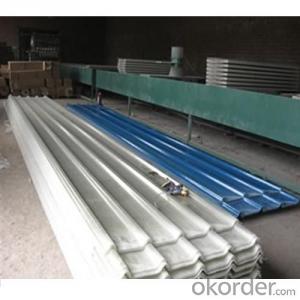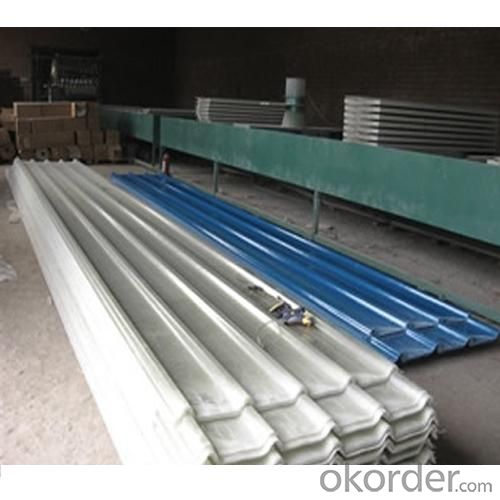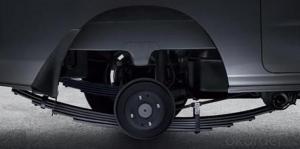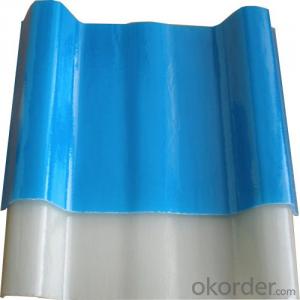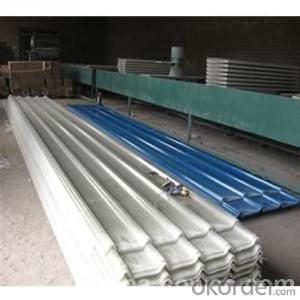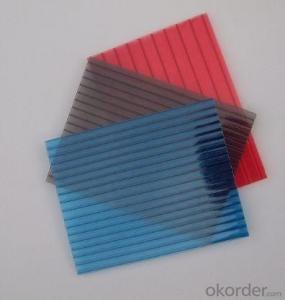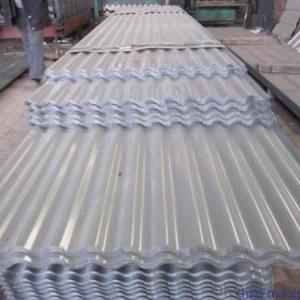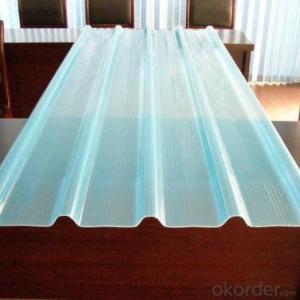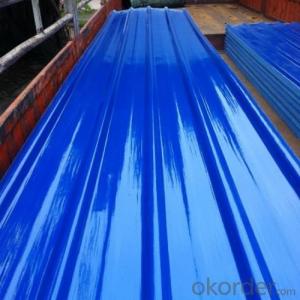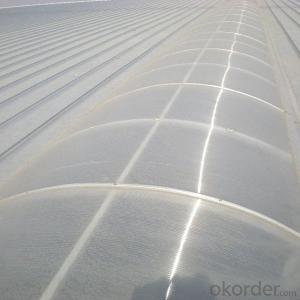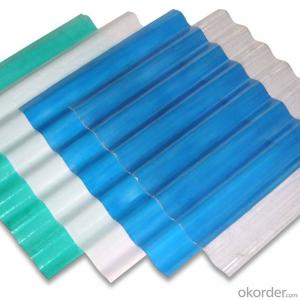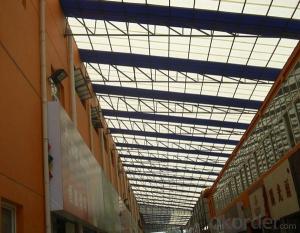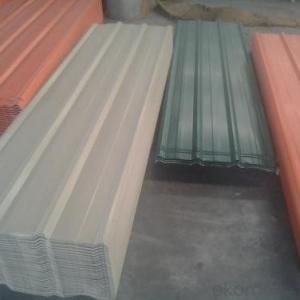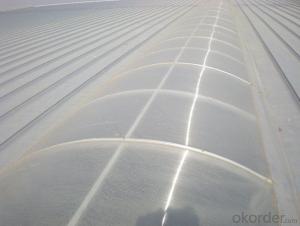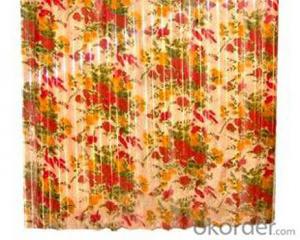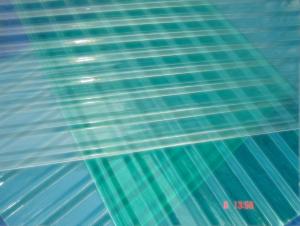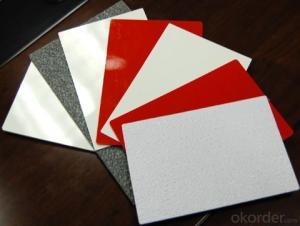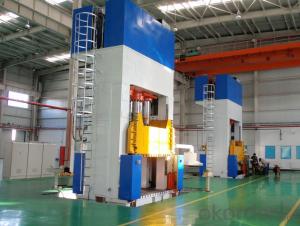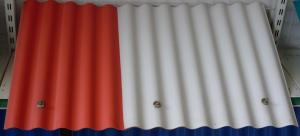FRP Roofing Panel - Fiberglass Panels for Diverse Applications
- Loading Port:
- Shanghai
- Payment Terms:
- TT or LC
- Min Order Qty:
- 20000 kg
- Supply Capability:
- 200000 kg/month
OKorder Service Pledge
OKorder Financial Service
You Might Also Like
Brief Introduction
the FRP anti-corrosion panel are produced in the same production line with FRP skylight panel, it has greater and more requirements of the professional technology. There are only a few of the manufacturers who can produce FRP opaque panels in China. A lot of FRP opaque corrugated panels have quality problems after intalled. Higoal is a mature manufacturer in producing FRP opaque corrugated panel (anti-corrosion panel), and has great advantages in both quality and lower cost.
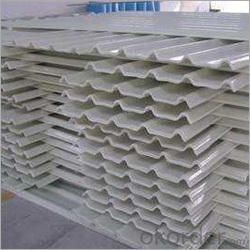
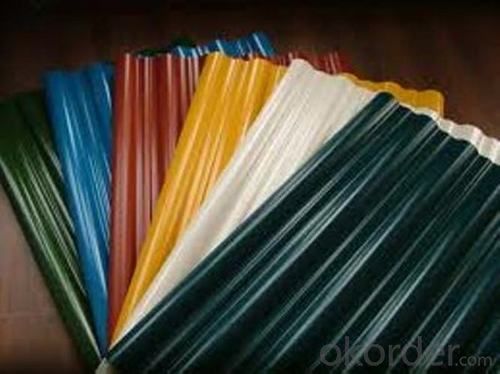
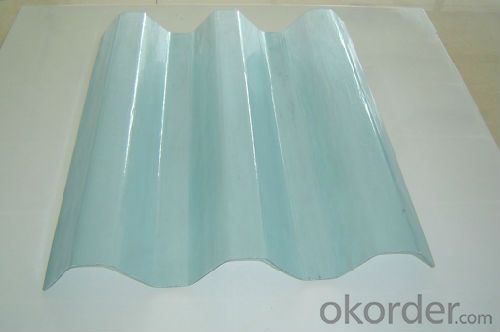
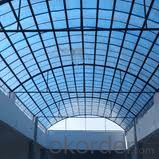
Characteristics
Mechanical properties: high rigidity lighting panels
Plate matches: match with general prepainted galvanized sheet, galvanized steel
Resin composites: Improved anti-aging SMR198 resin
Fiber reinforcement: E-glass fiber untwisted without glue
Surface treatment: affixing MELINEX301 film
Stiffener line: surface with longitudinal uniform distribution of anti-LAC gluten
Technical Specification
Glass fiber: not less than 28%
Unit Weight: 1800g / ㎡, 2400g / ㎡, 3050g / ㎡
Nominal thickness: 1.2 mm, 1.5mm, 2.0mm (tolerance ≤ 10%)
Temperature limits: -60 ℃ ~ +130 ℃
Transmittance (1.5mm): 72% ± 2% (fog white, sky blue, water green), 52% ± 2% (white porcelain)
UV-rate: 99%
Tensile strength: 90Mpa
Flexural strength: 160 Mpa
Elongation: 1.9%
Pap hardness: ≥ 50
Thermal expansion coefficient: 1.5 ~ 3.2 * 10-5 / K
Thermal conductivity: K = 0.23W / m * K
Guarantee: 15 years
NOTE: In special cases, the surface film varieties vary according to needs, such as Melinex389, PT055 and so on.
FAQ
Better property of corrosion resistant than clading panel and stainless steel, it was designed for the harsh conditions, which require products that can withstand corrosive chemicals, high temperature.
- Q: Can FRP roofing panels be used for universities?
- Certainly, universities can absolutely utilize FRP roofing panels. These panels, which are composed of Fiberglass Reinforced Plastic (FRP), boast a plethora of advantages that render them appropriate for university structures. Primarily, FRP panels possess a lightweight yet robust nature, simplifying installation while providing resilience to endure harsh weather conditions—an imperative attribute for university edifices subjected to heavy rainfall, snowfall, and gusty winds. An additional benefit of FRP roofing panels lies in their immunity to corrosion and UV rays. This characteristic grants them an extended lifespan and diminishes maintenance expenses for the university. Furthermore, FRP panels offer a high degree of customization, presenting an array of colors, styles, and finishes. This flexibility empowers universities to select panels that complement their architectural design and enhance the overall aesthetics of the campus. Furthermore, FRP roofing panels contribute to energy efficiency as they can be designed to permit natural light transmission, reducing the necessity for artificial lighting during daylight hours. This not only conserves energy but also fosters a comfortable, well-illuminated environment for students and staff. From a sustainability standpoint, FRP roofing panels are crafted from recycled materials and can be fully recycled at the conclusion of their lifecycle. This aligns with universities' mounting emphasis on environmental responsibility and aids in their green initiatives. Overall, the strength, durability, resistance to corrosion and UV rays, customizable designs, energy efficiency, and sustainability of FRP roofing panels make them an apt choice for universities.
- Q: Are FRP roofing panels compatible with different types of roofing systems?
- Yes, FRP (Fiberglass Reinforced Plastic) roofing panels are compatible with different types of roofing systems. They can be installed on various roofing systems such as flat roofs, sloped roofs, metal roofs, and even asphalt roofs. FRP panels are versatile and can be easily adapted to different roofing configurations, making them a suitable choice for diverse roofing applications.
- Q: Are FRP roofing panels suitable for office buildings?
- FRP roofing panels are well-suited for office buildings. They possess several qualities that make them a popular option for commercial structures. To start, they are lightweight yet strong, making installation and upkeep easy. This is advantageous for office buildings as it reduces the need for extensive structural modifications and allows for quicker construction or renovation processes. Moreover, FRP panels offer excellent resistance against harsh weather conditions, such as UV rays, extreme temperatures, and strong winds. This is crucial for office buildings that are often exposed to the elements. They require a roofing material that can withstand long-term exposure without deteriorating or needing frequent repairs. In addition, FRP roofing panels come in various colors, finishes, and designs, which allows for customization to match the architectural style and branding of the office building. This versatility makes FRP panels an appealing choice for businesses seeking to enhance the visual appeal of their office space. Furthermore, FRP panels are known for their energy efficiency. They possess excellent insulation properties, which helps regulate the temperature inside the office building. This reduces the reliance on heating and cooling systems, ultimately lowering energy costs. Lastly, FRP roofing panels are cost-effective compared to other materials. They have a long lifespan and require minimal maintenance, resulting in reduced long-term expenses for the office building owner. In conclusion, FRP roofing panels are a suitable option for office buildings due to their lightweight yet durable nature, resistance to harsh weather conditions, aesthetic versatility, energy efficiency, and cost-effectiveness.
- Q: Are FRP roofing panels suitable for shopping malls?
- Yes, FRP roofing panels are suitable for shopping malls. They are lightweight, durable, and provide excellent protection against weather elements. Additionally, their high strength-to-weight ratio and versatility make them ideal for large commercial structures like shopping malls.
- Q: Do FRP roofing panels have good sound insulation properties?
- FRP roofing panels lack good sound insulation properties. While they do offer some level of sound reduction, their main purpose is to provide durability and weather resistance for buildings and structures. Sound insulation mainly depends on the thickness and density of the material used. FRP panels are relatively thin and lightweight, so they have limited ability to block or absorb sound waves. Additionally, the smooth surface of FRP panels reflects sound instead of absorbing it. This can cause echo and reverberation in enclosed spaces, resulting in a louder and less acoustically pleasing environment. If sound insulation is crucial for your project, it is recommended to consider alternative roofing materials that are specifically designed for soundproofing. Examples include acoustic panels or specially engineered soundproofing membranes. These materials typically have higher density and are designed to effectively absorb or block sound waves, providing superior sound insulation properties.
- Q: Are FRP roofing panels suitable for green building projects?
- Yes, FRP roofing panels are suitable for green building projects. FRP (Fiberglass Reinforced Plastic) panels are lightweight, durable, and have excellent thermal insulation properties. They are also resistant to corrosion and require minimal maintenance, making them an environmentally friendly choice. Additionally, FRP panels are often made from recycled materials and can be recycled themselves, further contributing to sustainable building practices.
- Q: Can FRP roofing panels be used in military or government buildings?
- Military or government buildings can indeed utilize FRP (Fiberglass Reinforced Plastic) roofing panels. These panels offer a multitude of advantages that make them ideal for these types of structures. Firstly, they possess exceptional durability and resistance against impacts, corrosion, and chemical damage. As a result, they are well-suited for military and government buildings that may face harsh environmental conditions or potential attacks. Additionally, the lightweight nature of FRP panels proves advantageous for installation purposes. They are easy to handle and transport, facilitating quicker and more efficient construction or renovation of military or government facilities. Another crucial benefit of FRP roofing panels lies in their outstanding insulating properties. They effectively regulate temperature and minimize energy consumption, leading to reduced heating and cooling costs for these buildings. This is particularly vital for government buildings, where energy efficiency and sustainability often take precedence. Moreover, FRP panels offer versatility and can be tailored to meet specific requirements. They come in various colors, finishes, and profiles, allowing for design flexibility and aesthetic appeal. This is especially advantageous for military or government buildings that may necessitate specific branding or architectural specifications. In summary, due to their durability, lightweight nature, insulation capabilities, and customization options, FRP roofing panels are a suitable choice for military or government buildings.
- Q: Are FRP roofing panels suitable for recreational vehicles?
- Yes, FRP (Fiberglass Reinforced Panels) roofing panels are suitable for recreational vehicles. These panels are made from a combination of fiberglass and resin, which makes them lightweight yet durable. They are resistant to corrosion, UV rays, and extreme weather conditions, which are all important factors for RVs that are constantly exposed to the elements. FRP roofing panels also provide excellent insulation properties, helping to keep the interior of the RV cool in hot weather and warm in cold weather. This can greatly enhance the overall comfort level inside the vehicle, especially during long trips. Additionally, FRP panels are easy to install and maintain. They can be easily cut to fit the desired size and shape, allowing for customization and flexibility during the installation process. They are also resistant to mold, mildew, and rotting, ensuring a longer lifespan for the RV roof. Overall, FRP roofing panels are a great choice for recreational vehicles due to their lightweight nature, durability, weather resistance, insulation properties, and ease of installation and maintenance.
- Q: Are FRP roofing panels suitable for green building projects?
- Yes, FRP roofing panels are suitable for green building projects. FRP (Fiberglass Reinforced Plastic) panels are lightweight, durable, and have excellent thermal insulation properties. They are also resistant to corrosion and require minimal maintenance, making them an environmentally friendly choice. Additionally, FRP panels are often made from recycled materials and can be recycled themselves, further contributing to sustainable building practices.
- Q: Are FRP roofing panels compatible with different roof slopes?
- FRP roofing panels are suitable for various roof slopes. These panels are commonly utilized in both flat and sloped roofs due to their outstanding durability and resistance to harsh weather conditions. They can be installed on roofs with different degrees of slope, ranging from low-pitched roofs to steeper inclines. It is worth noting that the installation process may vary depending on the roof's slope. For roofs with low pitches, additional sealants or adhesives may be needed to prevent potential water leakage. Conversely, for steeper slopes, fasteners and appropriate mounting techniques should be employed to securely affix the panels. To ensure proper installation and compatibility with different roof slopes, it is advisable to consult with a professional or adhere to the manufacturer's guidelines.
Send your message to us
FRP Roofing Panel - Fiberglass Panels for Diverse Applications
- Loading Port:
- Shanghai
- Payment Terms:
- TT or LC
- Min Order Qty:
- 20000 kg
- Supply Capability:
- 200000 kg/month
OKorder Service Pledge
OKorder Financial Service
Similar products
Hot products
Hot Searches
Related keywords
